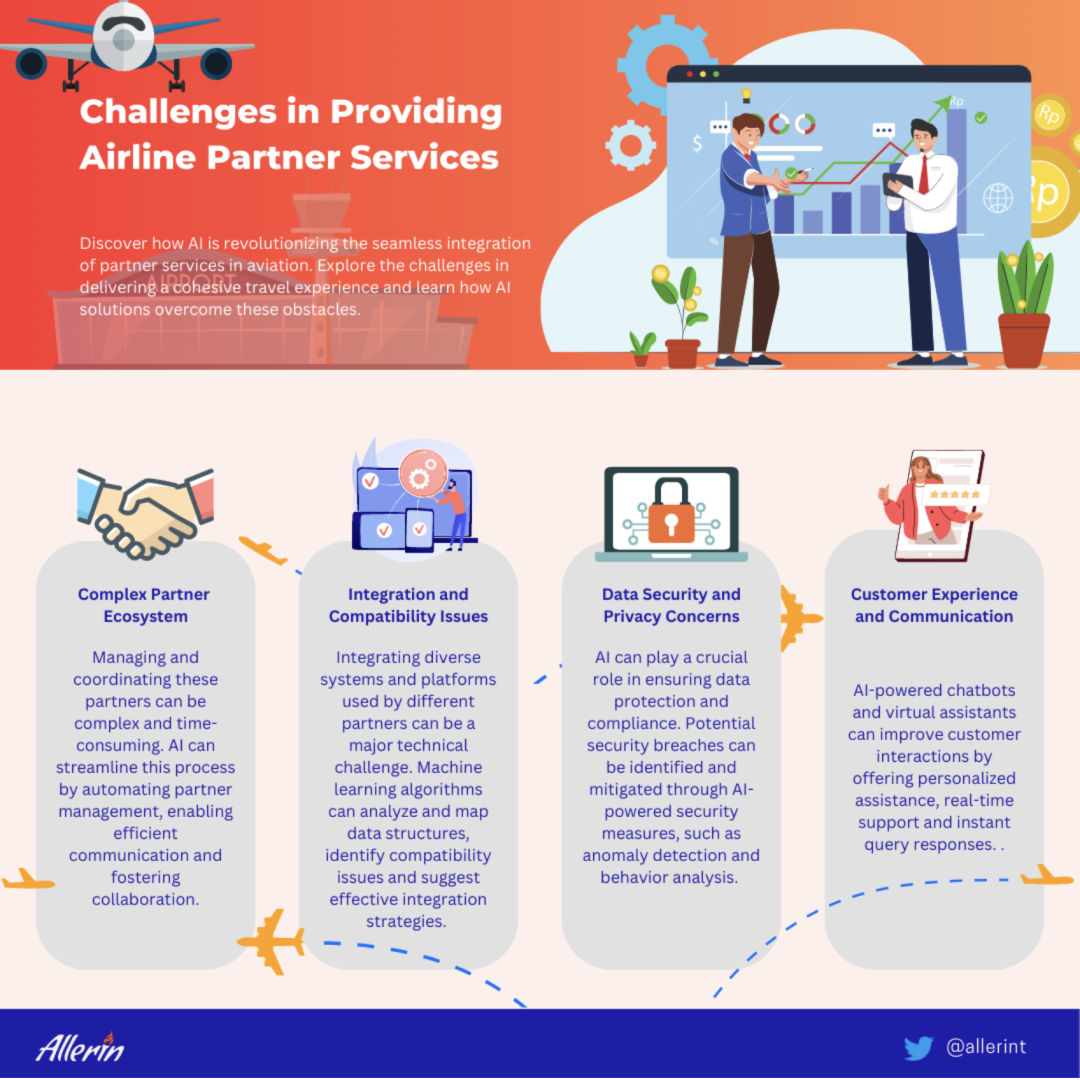
Charting the Turbulence: Obstacles Faced by Partner Services in Aviation
Delivering an enjoyable travel experience heavily relies on seamless integration with partner services.
Airlines depend on multiple partners such as travel agencies, airport ground services and others to ensure a smooth customer journey. Providing efficient and cohesive partner services poses significant challenges in the airline industry. This article explores the key challenges airlines face in integrating and delivering partner services and discusses how the use of AI in aviation is helping to overcome these obstacles.

COMPLEX PARTNER ECOSYSTEM
The airline industry involves a diverse range of partners, each with its own systems and processes. Managing and coordinating these partners can be complex and time-consuming. AI can streamline this process by automating partner management, enabling efficient communication and fostering collaboration.
INTEGRATION AND COMPATIBILITY ISSUES
Integrating diverse systems and platforms used by different partners can be a major technical challenge. For instance, different partners may use different formats for data and documents, which require conversion between systems.AI in aviation can help overcome this hurdle by providing intelligent integration solutions. Machine learning algorithms can analyze and map data structures, identify compatibility issues and suggest effective integration strategies. AI-driven middleware platforms can act as a bridge between disparate systems, enabling seamless data exchange and interoperability.
DATA SECURITY AND PRIVACY CONCERNS
Sharing sensitive customer data with partners raises concerns about data security and privacy. As more information is exchanged between different organizations, the risk of unauthorized access and misuse increases. Airlines need to implement robust data security protocols and encryption mechanisms to ensure secure data sharing with partners.AI can play a crucial role in ensuring data protection and compliance. Potential security breaches can be identified and mitigated through AI-powered security measures, such as anomaly detection and behavior analysis. Additionally, AI algorithms can help automate data anonymization and ensure adherence to data protection regulations, enhancing the overall security of partner services.
CUSTOMER EXPERIENCE AND COMMUNICATION
Providing a seamless and integrated customer experience across various partner touchpoints is critical. However, the airlines’ different systems and processes can create a complex environment that poses a challenge for creating a cohesive customer experience. This is further complicated by the need to collaborate with external partners.AI-powered chatbots and virtual assistants can improve customer interactions by offering personalized assistance, real-time support and instant query responses. These AI systems can understand natural language, interpret customer preferences and provide tailored recommendations. By leveraging AI, airlines can ensure consistent and effective communication with customers throughout their journey.
FUTURE OF AI IN AVIATION
The challenges associated with seamless integration with partner services can be effectively addressed by adopting AI in aviation. AI offers transformative solutions, from streamlining partner management to enhancing data security and customer experience. By embracing AI-driven innovations, airlines can overcome these challenges and create a seamlessly integrated partner ecosystem, ultimately delivering an exceptional travel experience to their customers.Trending
-
1 How Does SaaS Differ From IaaS And PaaS?
Fabrice Beaux -
2 Single Page Applications vs Multi-Page Applications
Fabrice Beaux -
3 Top 7 Effective Strategies for Multi-Language Website Development
Fabrice Beaux -
4 Boost Engagement to Infinity and Beyond: Unleashing AI-Driven Support
Anas Bouargane -
5 The Cheapest And Most Beautiful Stickers in CS2
Daniel Hall





Comments